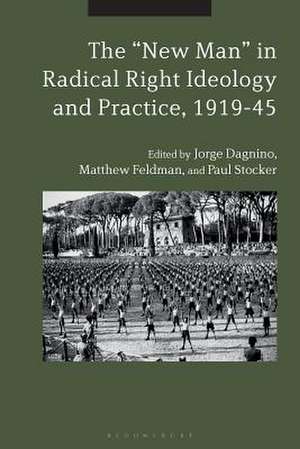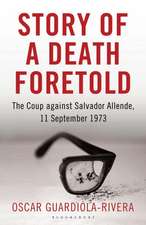The "New Man" in Radical Right Ideology and Practice, 1919-45
Editat de Dr Jorge Dagnino, Dr Matthew Feldman, Dr. Paul Stockeren Limba Engleză Paperback – 24 iul 2019
| Toate formatele și edițiile | Preț | Express |
|---|---|---|
| Paperback (1) | 232.90 lei 6-8 săpt. | |
| Bloomsbury Publishing – 24 iul 2019 | 232.90 lei 6-8 săpt. | |
| Hardback (1) | 716.56 lei 6-8 săpt. | |
| Bloomsbury Publishing – 24 ian 2018 | 716.56 lei 6-8 săpt. |
Preț: 232.90 lei
Preț vechi: 266.15 lei
-12% Nou
Puncte Express: 349
Preț estimativ în valută:
44.57€ • 47.66$ • 37.16£
44.57€ • 47.66$ • 37.16£
Carte tipărită la comandă
Livrare economică 17 aprilie-01 mai
Preluare comenzi: 021 569.72.76
Specificații
ISBN-13: 9781350123052
ISBN-10: 1350123056
Pagini: 320
Ilustrații: 11 bw illus
Dimensiuni: 156 x 234 x 17 mm
Greutate: 0.45 kg
Editura: Bloomsbury Publishing
Colecția Bloomsbury Academic
Locul publicării:London, United Kingdom
ISBN-10: 1350123056
Pagini: 320
Ilustrații: 11 bw illus
Dimensiuni: 156 x 234 x 17 mm
Greutate: 0.45 kg
Editura: Bloomsbury Publishing
Colecția Bloomsbury Academic
Locul publicării:London, United Kingdom
Caracteristici
The first book to examine the importance of the 'new man' principle as it manifested itself in fascist and other far-right, radical movements
Notă biografică
Jorge Dagnino is Assistant Professor in Modern European History at the Universidad de los Andes, Chile.Matthew Feldman is Professor in the History of Modern Ideas at Teesside University, UK, and co-director of the Centre for Fascist, Anti-fascist and Post-fascist Studies. Paul Stocker recently submitted his PhD thesis at Teesside University, UK. He is currently Lecturer at Richmond, the American International University in London, UK.
Cuprins
List of IllustrationsIntroduction: Building Illiberal Subjects: The New Man in the Radical Right Universe, 1919-45, Jorge Dagnino (Universidad de los Andes, Chile), Matthew Feldman (Teesside University, UK) and Paul Stocker (Richmond, the American International University in London, UK)Part I - Inaugurating the Radical Right 'New Man' in Fascist Italy 1. Totalitarian Pedagogy and the Italian Youth, Luca La Rovere (University of Perugia, Italy)2. Biotypology and Eugenics in Fascist Italy, Francesco Cassata (University of Genova, Italy)3. The Aviator as New Man, Fernando Esposito (Eberhard Karls University of Tübingen, Germany)Part II - The New Man in Axis Europe4. Eugenic Art: Hitler's Utopian Aesthetic, Gregory Maertz (St John's University, USA) 5. Army Educators and the Making of a "Total Man" in Late Fascist Croatia, Rory Yeomans (University of Oxford, UK)6. The "Everyman" of the Portuguese New State during the Fascist Era, Rita Almeida de Carvalho (University of Lisbon, Portugal) and António Costa Pinto (University of Lisbon, Portugal)Part III - The New Man in Radical Right Regimes beyond Europe7. Peronism: The Consumerist Revolution and the New Argentinean, Alberto Spektorowski (Tel Aviv University, Israel) 8. Envisioning the New Man in 1930s Brazil, Aristotle Kallis (Keele University, UK)9. Japan's Perennial New Man: The Liberal and Fascist Incarnations of Masamichi Royama, Roy Starrs (University of Otago, New Zealand)Part IV: The 'New Man' in European Fascist Movements10. Forging the "New Man" in Fascist Spain during the War and Its Aftermath, 1936-1948, David Alegre Lorenz (Autonomous University of Barcelona, Spain)11. Portraits of the New British Fascist Man, Jeannette Baxter (Anglia Ruskin University, UK)12. The Fascist New Man in France, 1919-1945, Joan Tumblety (University of Southampton, UK)13. The Salience of "New Man" Rhetoric in Romanian Fascist Movements, 1922-1944, Roland Clark (University of Liverpool, UK)
Recenzii
Comprising an introduction and 13 chapters (all with extensive notes and bibliography), this volume addresses regimes and radical movements, mainly fascist, in Italy, Germany, Croatia, Portugal, Spain, Britain, France, and Romania, and rightist regimes in Argentina, Brazil, and Japan. Summing Up: Recommended. Graduate students, researchers, faculty.
A useful contribution to fascist studies ... One of the anthology's strengths is the wide variety of different approaches, such as art, science, and political history, to understand and historicize interwar fascist ideology ... A highly recommended book.
This geographically and conceptually wide-ranging collection brightly elucidates the constructions and constrictions of the New Man in radical right politics and culture. Bringing together rising stars and leaders in the field, this rich collection of cutting-edge research and illuminating case studies does much to advance what deserve to be central debates about gender and masculinity in the fascist project. It is just what is needed to invigorate the field, and it will become essential reading for students and scholars.
This ground-breaking collection of essays is the first to seriously conceptualize and dissect the 'New Man' as constructed by radical right and fascist movements, parties and regimes during the first half of the twentieth century. The volume situates the phenomenon in the socio-cultural mileu of interwar Europe, but also examines cases in South America and Asia. Highly recommended for students of political ideologies.
A useful contribution to fascist studies ... One of the anthology's strengths is the wide variety of different approaches, such as art, science, and political history, to understand and historicize interwar fascist ideology ... A highly recommended book.
This geographically and conceptually wide-ranging collection brightly elucidates the constructions and constrictions of the New Man in radical right politics and culture. Bringing together rising stars and leaders in the field, this rich collection of cutting-edge research and illuminating case studies does much to advance what deserve to be central debates about gender and masculinity in the fascist project. It is just what is needed to invigorate the field, and it will become essential reading for students and scholars.
This ground-breaking collection of essays is the first to seriously conceptualize and dissect the 'New Man' as constructed by radical right and fascist movements, parties and regimes during the first half of the twentieth century. The volume situates the phenomenon in the socio-cultural mileu of interwar Europe, but also examines cases in South America and Asia. Highly recommended for students of political ideologies.







